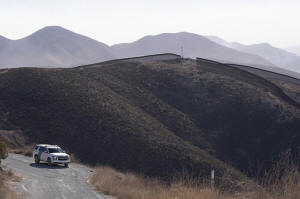Trump's border emergency declaration comes amid relative calm after
years of major turmoil
 Send a link to a friend
Send a link to a friend
 [January 25, 2025]
By ELLIOT SPAGAT, GREGORY BULL and EUGENE GARCIA [January 25, 2025]
By ELLIOT SPAGAT, GREGORY BULL and EUGENE GARCIA
SAN DIEGO (AP) — Long stretches of silence on a Border Patrol scanner
are punctuated with updates on tracking a single migrant for hours. The
radio traffic sounds like a throwback to earlier times, before the
United States became the largest destination for asylum-seekers in 2017.
“There's a pair way down there. We'll see if they start moving up,” one
agent says.
“Yeah, maybe they'll try to move north in a bit,” another responds.
Saying that “America's sovereignty is under attack,” President Donald
Trump's declaration of a border emergency comes at a time of relative
calm after years of deep turmoil. Active-duty military arrived Thursday
in San Diego and in El Paso, Texas, as part of an initial deployment of
1,500 troops.
Arrests for illegal border crossings plummeted more than 80% to about
47,000 in December from an all-time high of 250,000 the same period a
year earlier. Arrests fell by about half when Mexican authorities
increased enforcement within their own borders a year ago and by about
half again when former President Joe Biden introduced severe asylum
restrictions in June.

For Trump, Biden didn't go nearly far enough. The last monthly gauge of
border arrests under Biden hovered near 4 1/2-year lows and was below
much of 2019, during Trump's first term, but about triple from April
2017, early in Trump's presidency and a low point that he highlighted on
giant charts at campaign rallies.
The Associated Press joined the Border Patrol for six hours Thursday in
San Diego, the busiest corridor for illegal crossings much of the last
year, and found no migrants until the last half-hour.
Three Chinese men and one Malaysian turned themselves in to agents
minutes after walking through a gap in the border wall. Almost
simultaneously, eight from India and one from Nepal crossed and waited
for agents. The men were taken for processing to large white tents that
opened during Biden's presidency.
It was unclear what happened to them after that, but one of Trump's
biggest challenges is the enormous cost and diplomatic challenge of
deporting people to faraway places. The governments of Venezuela and
Nicaragua, both U.S. adversaries, refuse to take their citizens back,
for example. Cuba allows only limited flights.
The job of a Border Patrol agent has changed dramatically in recent
months, away from quickly processing and releasing asylum-seekers with
notices to appear in immigration court. Agents are returning to a more
traditional role tracking individuals and small groups trying to elude
capture.
Many agents chafed under Biden as arrests topped 2 million for two
straight years, though traffic slowed sharply before Trump took office
on Monday. The Border Patrol released fewer than 7,000 migrants in the
U.S. in December, down 96% from nearly 192,000 a year earlier. El Paso
reported 211 were released there in the third week of January, down from
more than 10,000 a week in December 2023.
In San Diego on Thursday, agents focused on an area of deceptively
treacherous mountain trails with expansive views of Tijuana, Mexico, its
urban sprawl and industrial warehouses in San Diego. Migrants who elude
capture walk as long as two days in the wilderness before arriving at
smugglers' vehicles. Agents parked in staging areas follow their
movements and discuss when to move in.
“Does anyone have eyes on them? You can't miss them,” one agent says on
the radio.
[to top of second column]
|

A Border Patrol vehicle sits near two border walls separating Mexico
from the United States, Thursday, Jan. 23, 2025, in San Diego. (AP
Photo/Gregory Bull)

“Potentially two so far,” another chimes in.
Less than a year ago, agents were overwhelmed by surrendering
asylum-seekers who waited up to several days in the heat or cold,
with the exposure of children to the dangerous temperatures inviting
a judge's scrutiny. On some nights hundreds were gathered border
walls in San Diego, as volunteers passed bandages, aspirin, juice
and sandwiches between slats in the barrier.
In remote, boulder-strewn mountains east of San Diego, large groups
crossed nightly, many from China and South America. Within a day or
two, asylum-seekers were dropped off at a bus stop in San Diego.
Karen Parker provides support and medical attention to migrants in
the mountains, such as treating broken ankles, cuts and parasite
wounds. She said she encountered 600 to 800 people per night a year
ago, but by early January there were mostly small groups with an
occasional larger one of around 40.
Since Trump took office, Parker said, it has been “a dead
standstill,” perhaps partly a result of freezing temperatures and
wildfires.
Parker sees more people getting picked up in sedans, a likely sign
of smuggling activity, than last year when border crossers generally
waited for the patrol to release them with notices to appear in
immigration court.
Arrests in the San Diego sector plunged to an average of 236 a day
during the last week of Biden's presidency, from more than 1,400 a
day in April. Wednesday's arrest tally was 136.
Trump's orders will hinge to a large extent on how he pays for
detention and transportation, as well as how he manages countries
that won't take back their citizens. During his first term, he used
emergency powers to divert billions of dollars from the Defense
Department for a border wall.
“To protect the security and safety of United States citizens, to
protect each of the States against invasion, and to uphold my duty
to take care that the laws be faithfully executed, it is my
responsibility as President to ensure that the illegal entry of
aliens into the United States via the southern border be immediately
and entirely stopped,” Trump said Monday in his emergency
declaration.

In Arizona, Pima County said Thursday it was closing two migrant
shelters in Tucson because the government has stopped releasing
people to them. Since 2019, the county had sheltered more than
518,000 migrants.
Jewish Family of Service of San Diego said Friday its shelter had
not received any migrants since the Trump administration ended use
of the online border app, CBP One, for migrants to legally enter. It
served 791 people the week before Trump took office.
___
Associated Press writer Jacques Billeaud in Phoenix contributed.
All contents © copyright 2025 Associated Press. All rights reserved |